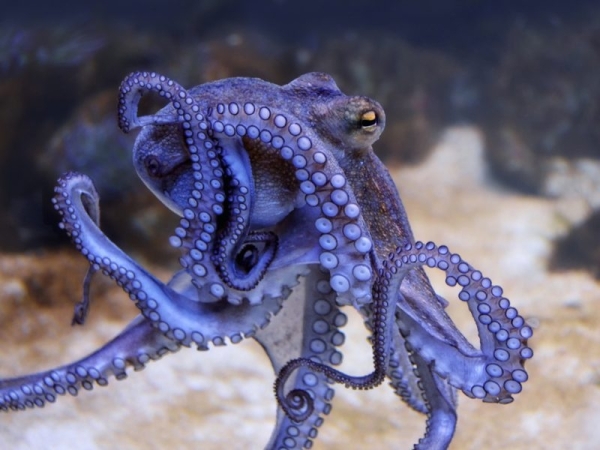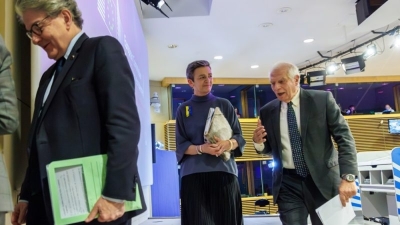Canary Islands government questions sustainability of EU’s first octopus farm project

The Canary Islands government requested a more in-depth impact study from the company behind the project to build Europe’s first-ever octopus farm, due to uncertainties overenvironmental consequences.
The octopus farm was due to be built in the Canary Islands this year, but authorities have now asked for further studies into the potential environmental impact of the project.
“[It] may have significant negative effects on the environment and […] must therefore be subject to the ordinary environmental impact assessment procedure”, concluded the government in its report, recently published.
This means that the company should provide new studies, further drawing out a controversy which has lasted for over two years.
The project, which aims to farm a million cephalopods in the port of Las Palmas in Gran Canaria, at a rate of 3,000 tonnes a year, would be the first of its kind in Europe.
For environmental NGOs, the consequences would be catastrophic not only for these intelligent and sensitive animals, but also for the surrounding environment.
According to them, the overcrowding in the tanks could encourage aggressiveness and even cannibalism.
Some 75 NGOs, experts and public figures sent an open letter to the government, demanding that the project be abandoned to avoid cruelty to animals, environmental damage and negative impacts on tourism.
New impact study required
The decision of the government comes after the examination of environmental impact report presented by Nueva Pescanova, the company applying to open the octopus farm.
On animal welfare, the company claims to be able to guarantee a mortality rate of no more than 10-15%, compared to an average 50% in the other aquaculture sectors.
The company explained the sustaible practices it intends to use in the management of water, energy, raw materials, and wild resources for octopus food, to ensure a low impact on the environment.
But the government believes that further studies are needed. The recommendations include a better assessment impact on wildlife such as cetaceans and sea turtles, due to the noise and pollution generated by the farm.
The public authorities also asked for a “detailed” description of the seawater catchment works to supply the basins and a “significant” increase in the production of photovoltaic energy on the site.
With regard to the consumption of natural resources to feed the octopuses, one of the sensitive points of the project, the government urged the company to “specify what type (species) of natural biological resources will be used” and their origin and quantities.
The project will therefore have to undergo a new environmental impact assessment.
“The environmental monitoring programme […] must be designed in such a way that the environmental situation is known before work begins, during the construction phase and subsequently during the project’s operational phase”, the government stated.
NGOs highlighting contradictions
For the NGOs Compassion in World Farming, Eurogroup for Animals and AnimaNaturalis, the company is “contradicting” its “own sustainability claims”.
“Nueva Pescanova’s environmental report was inadequate, lacking basic information to enable the government to assess the impact of the farm on the environment and public health”, said Maria Angeles López Lax, a lawyer with the specialist firm Legal Natura, in a press release issued by the NGOs on 9 April.
NGOs have been demanding an immediate halt to the project for several months. They are also calling on the European Commission to include a ban on octopus farming in its planned animal welfare legislation.
There is currently no law protecting cephalopods in Europe
On 3 May 2023, 30 MEPs sent a letter to the Canary Islands government expressing their concern that the project could lead to an “ecological disaster”.
On its website, Nueva Pescanova states that it is pursuing “major efforts to ensure best practice throughout our value chain”.
On 3 April, the company was recognised by the Seafood Stewardship Index 2023 as one of the companies “contributing most to a sustainable and responsible industry” on a global scale.
“We have aligned our strategy with the lines defined in the UN’s Agenda 2030 by developing a model of sustainability and responsibility”, the Spanish company added.
The project is supported by nine research centres in Spain, Portugal and Mexico, which see it as a major scientific breakthrough in meeting the growing global demand for octopus.
According to the United Nations Food and Agriculture Organisation (FAO), this market grew from $1.30 billion to $2.72 billion (€1.20 billion to €2.53 billion) between 2010 and 2019.

NGOs urge EU to oppose plans for world’s first octopus farm
The European Union should oppose what could become the world’s first octopus farm, two organisations said after plans for what they have termed a ‘cruel’ project to be located in the Canary Islands were announced.
Read more with Euractiv




